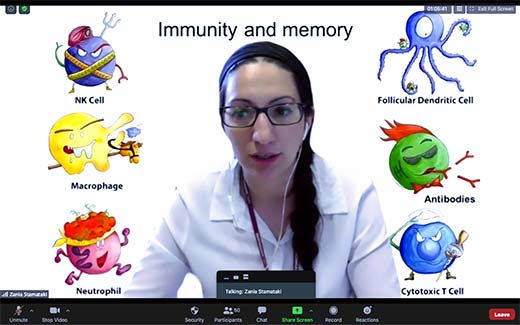Thursday, 6 August 2020
 Living with COVID 19
Living with COVID 19
and how we can fight back
Speaker: Dr Zania Stamataki
Todmorden U3A asked Dr Zania Stamataki, a Senior Lecturer in Virology, to give us a better understanding of what Covid-19 is doing in our bodies and an insight into how our bodies fight back.
The stimulating illustrated Zoom talk given on 17th September was attended by some 75 members and we were taken on an information-packed journey through the basics of viral immunity by an expert passionate teacher and presenter.

Zania, who confesses to being a virus nerd, was delighted to get back to the lab when Covid-19 emerged so she could get to grips with this new virus. Fortunately for her and her colleagues at Birmingham University, it is easily isolated for studying in the laboratory.
We needed some basic grounding.
It seems that viruses are unable to exist alone. They need to bind to our cells' receptors before injecting viral RNA into the cell, whose chemistry is then hijacked into replicating the virus until it is exhausted and self-destroys, releasing a rain of new viruses into the body, where the cycle begins again.
Favourite infection sites include the respiratory tract cells in the lungs, so when the virus is reproduced here, it is attached to micro droplets of moisture as we exhale. Wearing a face covering catches the virus in our expired breath, protecting others, but masks afford little protection from breathing in the virus. The best protection is keeping apart.
People can be infectious whilst they have no symptoms, either because they have not developed them yet, or because they are able to fight the disease and will never have symptoms. In the latter case, it is possibly due to having similar antibodies from other corona viruses, like the common cold. This may be the case in children and young people.
Worryingly for members of the U3A, older people are more likely to become seriously ill and have an increased mortality. After 10 to 14 days the virus will no longer be in the body, and one is then not infectious - hence the current imposition of a 14 day quarantine period.
So how do we fight back, once infected?
Immediately – as the first stage of the body's immune system response showed, with the natural killer cells recognising the infected cells and killing them. The dead cells are then removed by the macrophage and neutrophil cells.
In the second stage, the immune system recognises the coronavirus; the B cells then produce floods of antibodies, which are able to bind onto the spike protein of the virus. Disabled spikes cannot infect. Success!
Finally, bring on the most powerful actors, the specialized T cells, which take most time to produce, but they literally punch holes in infected cells. They can also cause a lot of tissue damage, so when the body recognizes that the infection is over, it is vital that to ramp down their production.
Will a vaccine save us?
If you've had Covid-19 and recovered, you are likely to be immune. Your B and T cells act as memory cells, ensuring a rapid response if the infection returns. This is the basis of vaccination; providing a piece of molecular information so that the B and T cells can prepare.
Historically, it has taken an average of 10 years to produce an effective vaccine for major diseases. With increased knowledge, better technology and funding along with the urgency of the pandemic, it is likely to be earlier for Covid-19. Currently, there are seven vaccines in the final stage of a four stage testing process.
Zania pointed out that since various vaccines are made with different parts of the virus, it is likely that eventually there will be a vaccine to suit everyone's body chemistry, age, and ethnicity. It is important that the whole human population is protected; otherwise the virus will continue to circulate in our super-connected world.
Zania made a final reassuring point: Coronavirus -19 does not affect our DNA, unlike herpes and HIV that persist in our bodies forever. When the virus is encountered and killed, it leaves our body completely.
This excellent and thoroughly engaging talk was followed by a stream of questions, all answered in great style.
The next Todmorden U3A Monthly Members Meeting by Zoom will be on Thursday October 15th at 1.45 pm, open to all fully paid up members for 2020. This will also be our AGM, so members are especially welcomed to join for this, if not the talk. Our presenter will be Jacob Kegerreis of the University of Durham, who will present his talk entitled, "Cosmic Collisions: Planetary Giant Impacts and supercomputer simulations"
Not yet a member? You can attend one talk free by requesting an invitation to this zoom event. We're always delighted to welcome new members.
Our contact details are www.u3atod.org.uk (website), info@u3atod.org.uk (email), or 01422 886021 (phone).
Many thanks to Fiona Ryland for this report
Previous U3A reports on the HebWeb - click here

